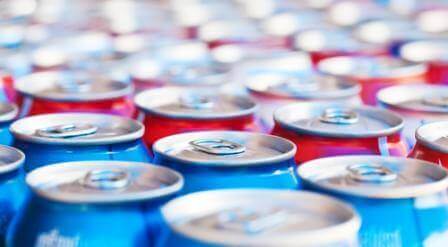Diet Soda and Dementia: What You Need to Know
A recent study found that drinking even one diet soda a day may triple your risk for developing dementia. But there’s a lot more to the story. Nutrition Diva explains.
Monica Reinagel, MS, LD/N, CNS
Listen
Diet Soda and Dementia: What You Need to Know

Sharyn posted her concerns on the Nutrition Diva facebook page:
“I’m disturbed by a report I heard yesterday about a possible link between artificial sweeteners and dementia. I’m reluctant to stop using artificial sweeteners on the basis of a single study. I’m in my 60’s and use artificial sweeteners daily. So sure, I’m concerned. Are there other studies that support this?”
As a matter of fact, Sharyn, there don’t seem to be any other studies linking artificial sweeteners to dementia. And I think your reluctance to change your behavior based on a single isolated finding is very reasonable—especially when we take a closer look at what this particular study actually found.
However, there may be other, more compelling arguments against daily consumption of artificial sweeteners. I’ll get back to those in a moment. For now, let’s take a look at what this most recent study does (and doesn’t) tell us about the relationship between artificial sweeteners and dementia risk.
Do artificial sweeteners cause dementia?
This is the first study to find a link between artificial sweeteners and dementia, mostly because this seems to be the first time researchers have looked for a connection between the two. I predict that this provocative finding will now prompt more researchers to ask the same question, which will shed a lot more light on the situation.
As it stands, the evidence that drinking diet soda may contribute to dementia risk is circumstantial, at best. This study simply observed that people who drink diet soda regularly are a lot more likely to eventually be diagnosed with Alzheimer’s disease or dementia.
However, further analysis found that those who drink diet soda are also more likely to be obese or have diabetes or heart disease. All of these conditions significantly increase your risk of developing Alzheimer’s disease. And if you are overweight or have diabetes, you might be more likely to drink diet soda because you’re trying to reduce your sugar or calorie intake.
So the real question here is: Does drinking diet soda increase your risk of dementia any more than having diabetes or being overweight already does?
And sure enough, when the researchers adjusted the analysis to account for these other risk factors, the link between diet soda consumption and dementia essentially disappeared.
So, in this case, Sharyn’s skepticism is absolutely the right impulse. There’s very little in this study to suggest that drinking diet soda affects your risk of dementia. However, there are several other good reasons to reconsider your diet soda habit.
3 Reasons to Think Twice about Diet Soda
Reason #1: Artificial sweeteners may increase your risk of diabetes. This is pretty ironic because—as I just mentioned—people with diabetes often choose artificial sweeteners in order to reduce their consumption of sugar. Although the sweeteners themselves don’t cause an increase in your blood sugar, research has found that they may impair your body’s ability to process carbohydrates from other foods you eat.
You can read more about this research in episode #390 Do Artificial Sweeteners Promote Diabetes?
As I explained in that show, having a diet soda with your meal is not the same as having water with your meal. Even though both have zero sugar and calories, your blood sugar is likely to be higher after the meal with the diet soda. Over time, those higher blood sugar and insulin spikes can increase your risk of developing Type 2 diabetes, as well as lead to weight gain.
Reason #2: Artificial sweeteners may promote weight gain. Although our bodies get no calories from artificial sweeteners, they still provide a food source for your gut bacteria. Different bacteria appear to prefer different sweeteners. Whichever strains of bacteria you feed are going to proliferate in your gut, often at the expense of others. Research suggests that artificial sweeteners tend to promote the growth of intestinal bacteria that are associated with weight gain and suppress the growth of intestinal bacteria associated with leanness.
This research is explored in more detail in episode #303: Artificial Sweeteners and Weight Gain.
Reason #3: Cutting out artificial sweeteners increases your enjoyment of healthier foods. This last reason is based not on research but on my own experience in working with hundreds of people on developing healthier eating habits.
I’ve found that people who drink diet soda or use artificial sweeteners tend to use a lot of them. Because they have no calories, people seem to think it’s OK to consume them in unlimited quantities. But people who drink artificially sweetened beverages all day long become so accustomed to the hyper-sweetness of artificial sweeteners that more natural foods taste dull and unsatisfying by comparison.
Because they have no calories, people seem to think it’s OK to consume them in unlimited quantities.
If you’re a heavy user, cutting down on artificially sweetened foods and beverages can be challenging. And yet, when people do this, they almost invariably tell me that they have a whole new appreciation for the flavor of foods.
“I can’t believe how delicious a piece of fruit tastes to me now,” one said to me recently. “Even vegetables are more delicious.”
In my experience, weaning yourself off of artificial sweeteners frequently results in a big upgrade in the overall nutritional quality of your diet—and I’ve never seen it lead to out of control sugar consumption or weight gain.
If you’ve cut back on your consumption of artificial sweeteners, I’d be interested to hear what you experienced. Post your comments below or on the Nutrition Diva Podcast Facebook page.
Image courtesy of Shutterstock.

